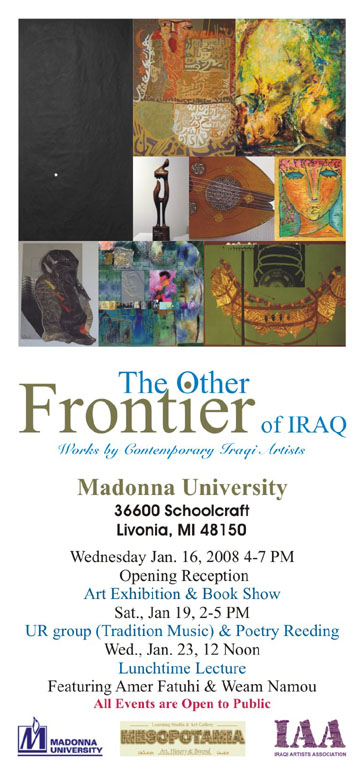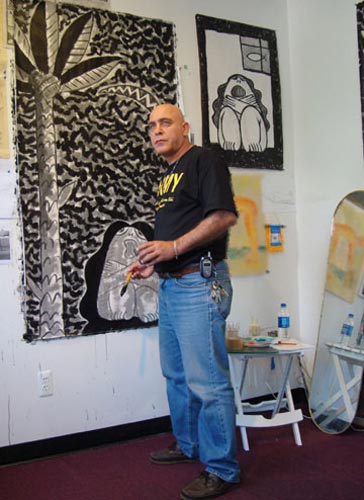'Iraq's Other Frontier' showcases Chaldeans
by Mervit Bashi
Themes ranging from the horror of war to the simplicity of everyday life were expressed in a variety of media at the first-ever Iraqi Cultural Week art show at Madonna University. The Other Frontier of Iraq: Works by Contemporary Iraqi Artists ran January 16-23 at the university campus in Livonia. The exhibit, open to all Iraqi artists but mainly featuring the work of Chaldeans across various media, was a collaboration between Madonna University, the Iraqi Artists Association (IAA) and Mesopotamia Art Gallery.

The show was one aspect of Iraqi Cultural Week, which was intended to increase awareness and understanding of the people, art and culture of Iraq through traditional music, poetry and art. Contemporary Chaldean artwork included digital media, mixed media and acrylic on canvas.
The art illustrated the everyday voice that resonates despite what today's news media conveys almost exclusively in terms of terrorism, bombings and violent extremists. The exhibit portrayed the thoughts of Iraqi artists amidst war but not only focused on war. The event provided a sampling of contemporary Iraqi art as well as a taste of historical art and culture from the region. Traditional Iraqi music (including the unique and rare Baghdadian form of music), poetry readings and a lecture by featured artist Amer Hanna Fatuhi rounded out the week. Signifying the contemporary nature of his art, I work with very different, non-traditional materials, said Fatuhi, who owns the Mesopotamia Art Gallery in Ferndale. He describes his work specifically as postmodernism. Sculpture by Mazin Elia, using wood to focus on the female form, exudes the maternal essence of the culture. Wood is a challenging sculpting material to work with, by as evident by his flowing figures, Elia succeeds.
Various books and writings were also on display and in some cases on sale. The books represented a cross section of plays, novels, history and much more by Chaldean authors. For instance, on view was Akitu, a traditional play about the Chaldean Babylonian New Year festival, by Chaldean author and playwright Marshal Garmo. Weam Namou's novels, including The Feminine Art, were displayed. Describing her work as a novelist and screenwriter, They are true life stories of Iraqis living everyday life during war, Namou said. When we talk to our relatives in Iraq, the war is not what we discuss each time we call. Sometimes it may not even come up. Educational books such as Chaldean for Kids by Margaret Shamoun and Melody Arabo focused on preserving the ancient spoken language of Chaldeans. In this same vein is the Chaldean Reading Book by Mary Yousif, revised by Fr. Jacob Yasso and illustrated and designed by Amer Hanna Fatuhi. The text emphasizes the pride of carrying on the language. Assyrian-Chaldean artist Paul Batou's poetry was on display, in addition to his paintings in the exhibit. My Last Thoughts on Iraq is an anthology of his poems, which are a compilation of his memories and experiences.
For more information visit, www.iraqiartists.org or www.mesopotamiaartgallery.com.

The show was one aspect of Iraqi Cultural Week, which was intended to increase awareness and understanding of the people, art and culture of Iraq through traditional music, poetry and art. Contemporary Chaldean artwork included digital media, mixed media and acrylic on canvas.
The art illustrated the everyday voice that resonates despite what today's news media conveys almost exclusively in terms of terrorism, bombings and violent extremists. The exhibit portrayed the thoughts of Iraqi artists amidst war but not only focused on war. The event provided a sampling of contemporary Iraqi art as well as a taste of historical art and culture from the region. Traditional Iraqi music (including the unique and rare Baghdadian form of music), poetry readings and a lecture by featured artist Amer Hanna Fatuhi rounded out the week. Signifying the contemporary nature of his art, I work with very different, non-traditional materials, said Fatuhi, who owns the Mesopotamia Art Gallery in Ferndale. He describes his work specifically as postmodernism. Sculpture by Mazin Elia, using wood to focus on the female form, exudes the maternal essence of the culture. Wood is a challenging sculpting material to work with, by as evident by his flowing figures, Elia succeeds.
Various books and writings were also on display and in some cases on sale. The books represented a cross section of plays, novels, history and much more by Chaldean authors. For instance, on view was Akitu, a traditional play about the Chaldean Babylonian New Year festival, by Chaldean author and playwright Marshal Garmo. Weam Namou's novels, including The Feminine Art, were displayed. Describing her work as a novelist and screenwriter, They are true life stories of Iraqis living everyday life during war, Namou said. When we talk to our relatives in Iraq, the war is not what we discuss each time we call. Sometimes it may not even come up. Educational books such as Chaldean for Kids by Margaret Shamoun and Melody Arabo focused on preserving the ancient spoken language of Chaldeans. In this same vein is the Chaldean Reading Book by Mary Yousif, revised by Fr. Jacob Yasso and illustrated and designed by Amer Hanna Fatuhi. The text emphasizes the pride of carrying on the language. Assyrian-Chaldean artist Paul Batou's poetry was on display, in addition to his paintings in the exhibit. My Last Thoughts on Iraq is an anthology of his poems, which are a compilation of his memories and experiences.
For more information visit, www.iraqiartists.org or www.mesopotamiaartgallery.com.

